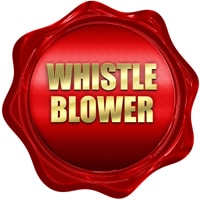 A recent ethics survey has revealed that whistleblowers typically face many challenges when they choose to do the right thing. The legal definition of whistleblowing is the disclosure by a person, usually an employee in a government agency or private enterprise, to the public or to those in authority, of mismanagement, corruption, illegality, or some other wrongdoing. It takes courage to report your employer, both before and after you file a complaint.
A recent ethics survey has revealed that whistleblowers typically face many challenges when they choose to do the right thing. The legal definition of whistleblowing is the disclosure by a person, usually an employee in a government agency or private enterprise, to the public or to those in authority, of mismanagement, corruption, illegality, or some other wrongdoing. It takes courage to report your employer, both before and after you file a complaint.
The Global Business Ethics Survey, which is part of the Ethics & Compliance Initiative, uncovered the following troublesome facts:
- More than one in three employees in the private sector who reported wrongdoing experienced retaliation
- Misconduct is witnessed quite often; 33 percent on average
- Worldwide, 22 percent of public sector employees feel pressure to compromise organizational standards
- Almost 75 percent of employees who felt pressured to compromise also witnessed wrongdoing
- Of those employees who experienced retaliation, 72 percent said it happened within three weeks of filing a report
Before you file a report against an employer who has engaged in misconduct, you should know your rights. Whistleblower statutes protect employees who launch an investigation from discrimination and wrongful termination. Statutes vary by state and some may apply only to public employees, while others apply to both public and private employees, and employees of public contractors. A qualified employment lawyer can help guide you by interpreting your rights and advocating for you.
You have a right to report wrongdoing in the workplace without fear of harassment or retaliation. If you have experienced retaliation at work after blowing the whistle, the Philadelphia whistleblower lawyers at The Gold Law Firm P.C. can help you obtain the compensation you deserve. Contact us online or call 215-569-1999 for a free consultation.





































